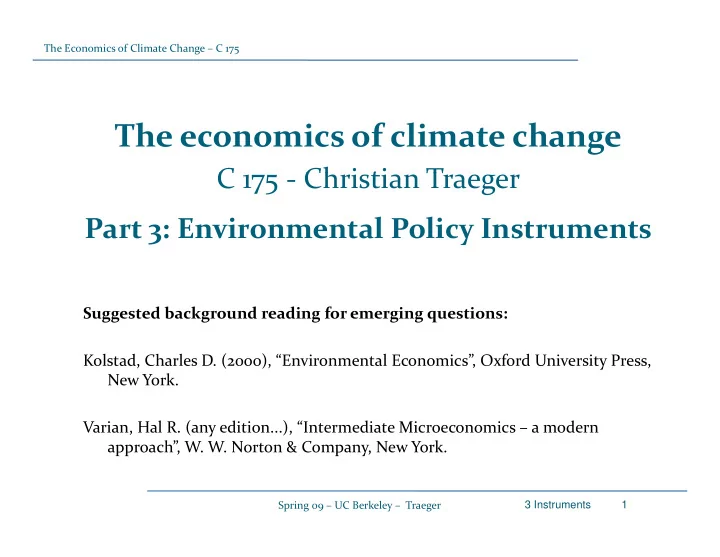

The Economics of Climate Change – C 175 The economics of climate change C C 175 ‐ Christian Traeger Ch i ti T Part 3: Environmental Policy Instruments 3 y Suggested background reading for emerging questions: Suggested background reading for emerging questions: Kolstad, Charles D. (2000), “Environmental Economics”, Oxford University Press, New York New York. Varian, Hal R. (any edition...), “Intermediate Microeconomics – a modern approach”, W. W. Norton & Company, New York. pp , p y, Spring 09 – UC Berkeley – Traeger 3 Instruments 1
The Economics of Climate Change – C 175 The Economics of Climate Change C 175 ‐ Christian Traeger 75 g Part 3: Policy Instruments Introduction on Instrument Choice Introduction on Instrument Choice Read: Section 4 of Congressional Budget Office (2003), “The Economics of Climate Change: A Primer” Spring 09 – UC Berkeley – Traeger 3 Instruments 2
The Economics of Climate Change – C 175 Problem description Problem is that actions taken by agents affect profit/welfare of other agents If the first group of agents does not take this into account when making decisions, there is an externality (external effect) g y Production and consumption activities cause emissions of GHGs GHGs cause enhanced greenhouse effect with all kinds of GHG h d h ff t ith ll ki d f negative (and positive!!) welfare effects Total (global) welfare not maximised if we rely on ‚the market‘ to solve the problem: too high emissions How can we correct for this externality? Spring 09 – UC Berkeley – Traeger 3 Instruments 3
The Economics of Climate Change – C 175 Instrument choice Possible: Market based instruments: Bargaining Tax/subsidy T / b id Tradable permits Other instruments: Technology control (e.g. BATNEEC) Damage control, prohibition Liability Spring 09 – UC Berkeley – Traeger 3 Instruments 4
The Economics of Climate Change – C 175 Instrument choice • Which instrument is best?? Possible criteria: – Ecological accuracy – Static cost-effectiveness – Dynamic cost-effectiveness – Political acceptability (polluters) Spring 09 – UC Berkeley – Traeger 3 Instruments 5
The Economics of Climate Change – C 175 Scientific/Ecological accuracy Aim is to achieve some emission target, or stock of GHGs in the atmosphere Instrument must make sure that we achieve this target!! Or perhaps there is a trade off ? Or perhaps there is a trade ‐ off…? Spring 09 – UC Berkeley – Traeger 3 Instruments 6
The Economics of Climate Change – C 175 Static cost ‐ effectiveness Instrument is cost ‐ effective if real resource cost of obtaining policy target is no greater than that of any other instrument Example: pollution abatement in production: Example: pollution abatement in production: Necessary condition for abatement at least cost is that marginal abatement cost be equalized over all firms with positive emissions Why? > Intuition! Why? ‐ > Intuition! Formal derivation: Firm i ’s abatement cost: c i (e i ) , Government’s target: Σ i e i ≤ E, i=1,…,N N - 1 N - 1 for all i=1,…,N ‐ 1 min c (e ) c E e i i N i i 1 i 1 c ‘(e ) = c ‘(e ) = c ‘(e ) for all i j=1 c i (e i ) = c N (e N ) = c j (e j ) for all i,j=1,…N N thus marginal costs same for all firms Market ‐ based instruments (Pigouvian tax, tradable permits) are cost ‐ effective instruments t ff ti i t t Spring 09 – UC Berkeley – Traeger 3 Instruments 7
The Economics of Climate Change – C 175 Dynamic cost ‐ effectiveness Important way to reduce emissions: new technologies How do policy instruments affect incentives to develop new technologies? Minimize costs to achieve a target over some time horizon: Minimize costs to achieve a target over some time ‐ horizon: dynamic efficiency Spring 09 – UC Berkeley – Traeger 3 Instruments 8
The Economics of Climate Change – C 175 Political acceptability All policy goes via political systems Politicians sensitive for lobbying “Climate policy is costly!!” “If costs are high, industry will loose jobs!!” Policy (target + instrument chosen) must be acceptable for polluters p Spring 09 – UC Berkeley – Traeger 3 Instruments 9
Recommend
More recommend